While pressing for a sound comprehensive agreement with Iran, the U.S. should prepare for a possible failure of nuclear negotiations. In that event, Robert Einhorn and Kenneth Pollack recommend that President Obama reinforce international support for strengthening sanctions, and for credibly threatening much greater penalties for any Iranian movement toward or across the nuclear threshold.
 |
MEMORANDUM TO: President Obama |
Summary and Recommendations
While our negotiators are working hard to get a final nuclear agreement with Iran that meets our requirements, we must be prepared for the possibility that negotiations will fail and the Iranians will then direct their efforts toward eroding sanctions and advancing their nuclear program. The opening created by President Hassan Rouhani’s overtures would close.
In this scenario, Iran would reject any extension of the current interim agreement, portray itself publicly as having been the reasonable side in the talks, reach out aggressively to governments and companies around the world to entice them to circumvent or ignore sanctions, and ramp up nuclear activities that have been frozen under the interim deal.
We should seek to head off this scenario by keeping the pressure on Iran to accept a final agreement along the lines of our proposal. That will involve three priorities: (1) continuing to urge governments and companies to enforce existing sanctions, (2) showing additional flexibility within the delegation’s existing instructions to avoid an Iranian narrative that we are the intransigent party, and (3) maintaining a strong consensus among the P5+1 governments and the broader international sanctions coalition that the rigorous measures necessary to make a deal acceptable to us are reasonable, fair and essential to a sound agreement.
At the same time, we need to prepare for the possibility that no agreement will be reached and Iran will attempt to turn that eventuality to their advantage. To thwart that attempt, we would have to ensure that Iran bears the onus for any breakdown of the talks. We would also want to work with Congress to adopt additional sanctions, urge key states (including Russia and China) to press Iran not to further advance its nuclear program, and convey a clear message to Iran that movement toward or across the nuclear threshold would be met by a firm international response that could involve much stronger sanctions and perhaps more coercive measures.
Background
Thanks largely to the crippling sanctions we worked hard to put in place, we were able to achieve the six-month “interim” deal that halted further progress in Iran’s nuclear program at a minimal price in terms of measures to ease sanctions. But negotiations on a final agreement may prove difficult, or even impossible, to bring to a successful conclusion.
To detect and deter any Iranian decision to break out and move to build nuclear weapons, we have proposed going well beyond a freeze of Iran’s nuclear activities to a major reduction of its nuclear infrastructure, and we have sought verification measures that exceed the requirements of the International Atomic Energy Agency (IAEA) Additional Protocol. These tough proposals can help restrain Israeli public attacks, although the Israelis can be expected to strongly oppose any watering down of our positions. On the other hand, the Russians and Chinese can be expected to favor significant compromises in order to gain agreement.
The Iranian negotiators have demonstrated the same seriousness of purpose as they did during negotiations of the interim deal. But they oppose deep reductions in their enrichment capacity, insist on operating the Arak reactor and Fordow enrichment plant, and have resisted monitoring arrangements that go beyond the Additional Protocol.
The domestic Iranian backlash against the interim agreement and our negotiating position for a final agreement has been intense. The newspaper Kayhan, the Islamic Revolutionary Guard Corps (IRGC), and hardliners in the Majlis have been outspoken critics of the Iranian negotiators and their efforts. In a mirror image of the positions taken by American critics, they argue that the interim deal concedes too much and receives too little in return. They inaccurately claim that we have already accepted a legal “right to enrich” and assert that we are reneging on the interim deal by denying such acceptance.
IRGC Commander Jafari has publicly attacked Foreign Minister and chief negotiator Zarif, who has pushed back firmly and asserted that his negotiating team has the support of the Supreme Leader. Critics in the Majlis have strongly condemned the introduction of a new sanctions bill in our Congress and retaliated by introducing their own legislation that would mandate increasing Iranian enrichment levels to 60 percent, ostensibly for submarine propulsion. To justify a retention and even expansion of Iran’s enrichment capacity, Atomic Energy Organization of Iran head Salehi has spoken of the need to provide fuel for several new nuclear power reactors.
While continuing to press for a final deal, we need to recognize that, given the wide gap between U.S. and Iranian positions as well as domestic opposition in Tehran, such a final deal may be very difficult to achieve. If prospects for a negotiated outcome begin to look remote, we may soon find ourselves confronted by an aggressive Iranian effort to erode the sanctions in the absence of agreement and to move its nuclear program closer to the weapons threshold.
We must seek to head this off by continuing to press for a final deal consistent with our requirements. We should aggressively enforce existing sanctions, both to maintain powerful incentives for Iran to reach agreement and to signal to the Iranians the futility of trying to undermine support for sanctions without an agreement. At the same time, we need to publicize for Iranian audiences the benefits they have realized from the initial sanctions easing measures and the much greater benefits they would realize under a final agreement. We should be willing to accept some modifications to our initial position (e.g., acceptance of somewhat greater centrifuge numbers), both because such modifications would still leave the terms well within our necessary requirements, and because doing so would demonstrate our willingness to compromise to reach a final deal. Meanwhile, we should seek to convince the other members of the P-5+1 of the necessity and appropriateness of our (modified) position, thereby solidifying support for a tough overall agreement that substantially reduces Iran’s breakout capability.
While pressing for an acceptable agreement, we must also prepare for the eventuality that the interim deal will lapse and that Iran will seek to undermine sanctions and resume its nuclear activities. In that circumstance, we would need to demonstrate that Iran, and not the P5+1, was responsible for the breakdown, explaining publicly that our position was supportive of meeting the practical needs of Iran’s civil nuclear energy program. We would discourage Iran from moving closer to a rapid breakout capability—in particular, by urging countries with influence in Tehran, including Russia and China, to press Iran’s leaders to forgo such steps and by encouraging the international community at large to convey a clear message to Iran that such action would be met by a sharp ratcheting up of sanctions or even more coercive actions.
To thwart Iranian efforts to erode the sanctions regime without an agreement, we would consult actively with members of the international sanctions coalition to explain that prospects for resolving the issue diplomatically and avoiding a military confrontation depend on maintaining a united front on sanctions. We would also work with Congress to adopt additional sanctions and make the case internationally on the need for ramping them up. To encourage Iran’s crude oil purchasers to make further reductions, we could continue urging major producers in the Middle East, Africa and North America to increase production in order to provide alternate sources of supply.
Our goal in pursuing these policies would be to make the Iranians amenable to accepting a deal along the lines we propose or, failing a negotiated solution, to deter significant Iranian movement toward or across the nuclear threshold.
Conclusion
We can still achieve a sound final agreement before the expiration of the interim deal, but that will require demonstrating convincingly to the Iranians that the only way to get the sanctions relief they seek is by coming to terms with the P5+1. But if the Iranians are not prepared to come to terms and instead seek to undermine sanctions without an agreement, we need to make sure they bear the onus for the impasse, reinforce international resolve to maintain and increase sanctions, and build support for credibly threatening to impose additional costs for moving toward and across the nuclear threshold.
Read last year’s related Big Bets and Black Swans memo, “Turning Tehran” by Suzanne Maloney »




